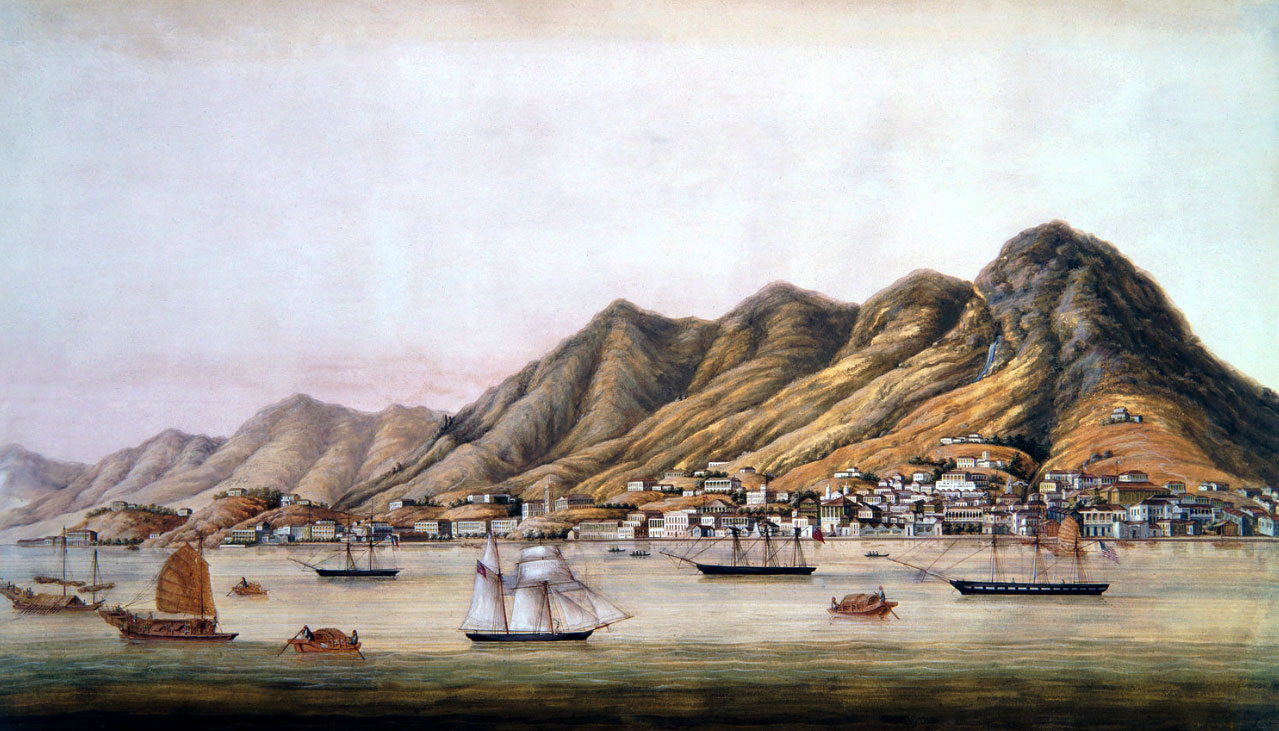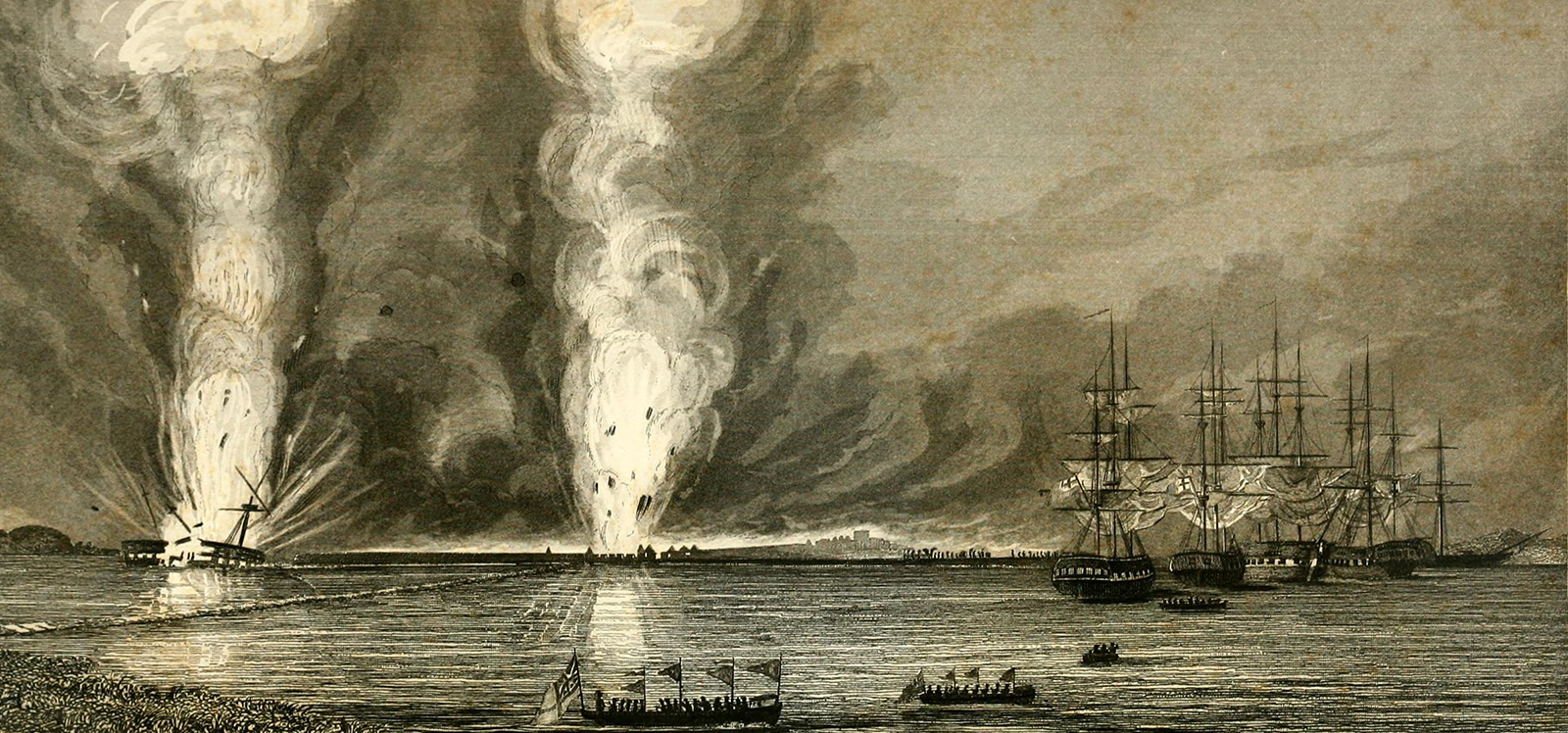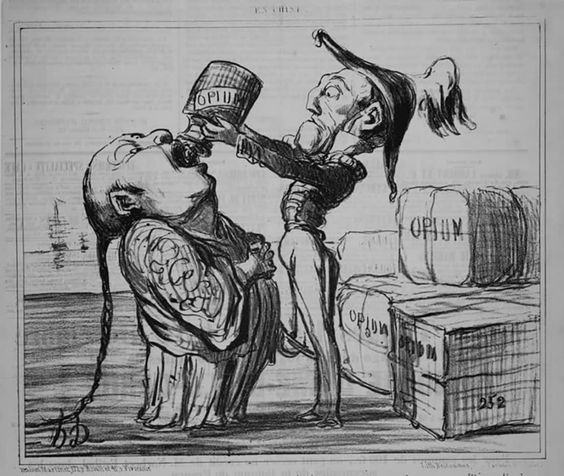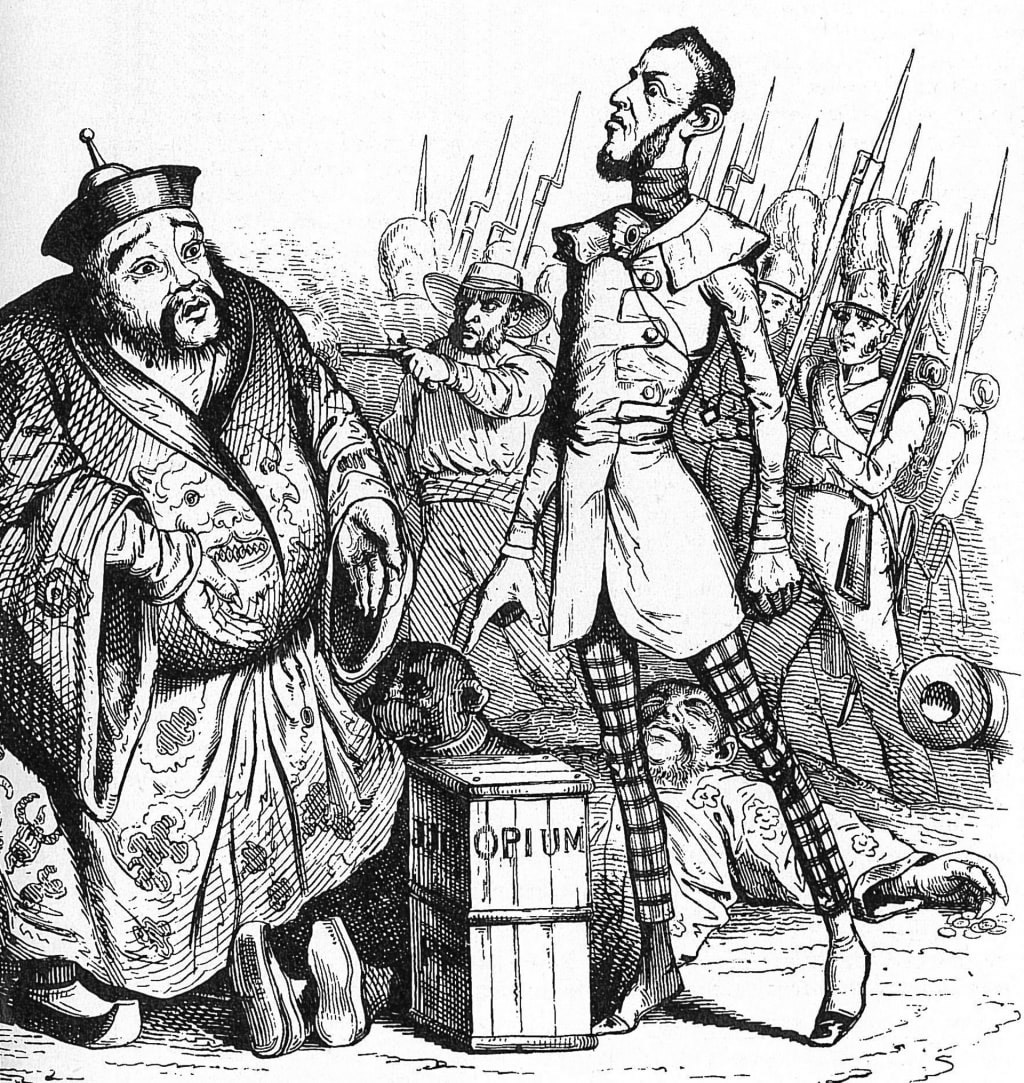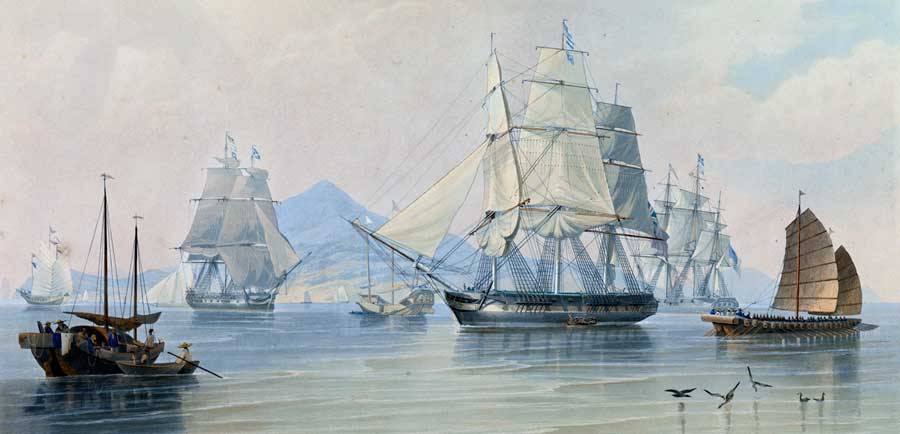Lord Palmerston, Opium Wars and China
LIN ZEXU, LETTER TO QUEEN VICTORIA (1839)
This letter was written by Lin Zexu, an important official in the Qing Dynasty, to Queen Victoria of Britain. He wrote in response to the growing opium trade in China. For nearly 300 years, the Chinese had desired nothing from the Europeans but silver. In the late 1700s, however, British merchants discovered an insatiable desire in China for opium. Traders began delivering every greater quantities of the substance to Chinese territorial waters, where their local counterparts added it to growing domestic production. (At this time, opium was not illegal in Britain.) By the early 1800s, the drug was being used very widely in China and was causing terrible social and health problems. The letter announced that China would no longer tolerate the selling of opium and would take actions against traders. Commissioner Lin’s words, which treat Britain as a tributary state dependent on the benevolence of China, reflect the arrogance China had towards the outside world. However, the letter also reveals the tensions building in China and the unsettling implications of Europe’s imperialistic designs. These fears were confirmed in the First Opium War a year later, when the British inflicted crushing defeats on the Chinese military and shattered the Chinese vision of omnipotence. The British used the victory not only promote to the growth of the opium trade, but also to open China to increasing Western influence.
Letter to the Queen of England, from the high Imperial Commissioner Lin, and his colleagues.
From the Canton press.
Lin, high imperial commissioner a president of the Board of War, viceroy of the two Kwang provinces, &c., and E, a vice-president of the Board of War, lieut.-governor of Kwangtung, &c., hereby conjointly address this public dispatch to the queen of England for the purpose of giving her clear and distinct information (on the state of affairs) &c.

It is only our high and mighty emperor, who alike supports and cherishes those of the Inner Land, and those from beyond the seas—who looks upon all mankind with equal benevolence—who, if a source of profit exists anywhere, diffuses it over the whole world— who, if the tree of evil takes root anywhere, plucks it up for the benefit of all nations—who, in a word, hath implanted in his breast that heart (by which beneficent nature herself) governs the heavens and the earth! You, the queen of your honorable nation, sit upon a throne occupied through successive generations by predecessors, all of whom have been styled respectful and obedient. Looking over the public documents accompanying the tribute sent (by your predecessors) on various occasions, we find the following: "All the people of my country, arriving at the Central Land for purposes of trade, have to feel grateful to the great emperor for the most perfect justice, for the kindest treatment," and other words to that effect. Delighted did we feel that the kings of your honorable nation so clearly understood the great principles of propriety, and were so deeply grateful for the heavenly goodness (of our emperor):—therefore, it was that we of the heavenly dynasty nourished and cherished your people from afar, and bestowed upon them redoubled proofs of our urbanity and kindness. It is merely from these circumstances, that your country— deriving immense advantage from its commercial intercourse with us, which has endured now two hundred years—has become the rich and flourishing kingdom that it is said to be!
But, during the commercial intercourse which has existed so long, among the numerous foreign merchants resorting hither, are wheat and tares, good and bad; and of these latter are some, who, by means of introducing opium by stealth, have seduced our Chinese people, and caused every province of the land to overflow with that poison. These then know merely to advantage themselves, they care not about injuring others! This is a principle which heaven's Providence repugnates; and which mankind conjointly look upon with abhorrence! Moreover, the great emperor hearing of it, actually quivered with indignation, and especially dispatched me, the commissioner, to Canton, that in conjunction with the viceroy and lieut.-governor of the province, means might be taken for its suppression!
Every native of the Inner Land who sells opium, as also all who smoke it, are alike adjudged to death. Were we then to go back and take up the crimes of the foreigners, who, by selling it for many years have induced dreadful calamity and robbed us of enormous wealth, and punish them with equal severity, our laws could not but award to them absolute annihilation! But, considering that these said foreigners did yet repent of their crime, and with a sincere heart beg for mercy; that they took 20,283 chests of opium piled up in their store-ships, and through Elliot, the superintendent of the trade of your said country, petitioned that they might be delivered up to us, when the same were all utterly destroyed, of which we, the imperial commissioner and colleagues, made a duly prepared memorial to his majesty;—considering these circumstances, we have happily received a fresh proof of the extraordinary goodness of the great emperor, inasmuch as he who voluntarily comes forward, may yet be deemed a fit subject for mercy, and his crimes be graciously remitted him. But as for him who again knowingly violates the laws, difficult indeed will it be thus to go on repeatedly pardoning! He or they shall alike be doomed to the penalties of the new statute. We presume that you, the sovereign of your honorable nation, on pouring out your heart before the altar of eternal justice, cannot but command all foreigners with the deepest respect to reverence our laws! If we only lay clearly before your eyes, what is profitable and what is destructive, you will then know that the statutes of the heavenly dynasty cannot but be obeyed with fear and trembling!
We find that your country is distant from us about sixty or seventy thousand miles,2 that your foreign ships come hither striving the one with the other for our trade, and for the simple reason of their strong desire to reap a profit. Now, out of the wealth of our Inner Land, if we take a part to bestow upon foreigners from afar, it follows, that the immense wealth which the said foreigners amass, ought properly speaking to be portion of our own native Chinese people. By what principle of reason then, should these foreigners send in return a poisonous drug, which involves in destruction those very natives of China? Without meaning to say that the foreigners harbor such destructive intentions in their hearts, we yet positively assert that from their inordinate thirst after gain, they are perfectly careless about the injuries they inflict upon us! And such being the case, we should like to ask what has become of that conscience which heaven has implanted in the breasts of all men?
We have heard that in your own country opium is prohibited with the utmost strictness and severity:—this is a strong proof that you know full well how hurtful it is to mankind. Since then you do not permit it to injure your own country, you ought not to have the injurious drug transferred to another country, and above all others, how much less to the Inner Land! Of the products which China exports to your foreign countries, there is not one which is not beneficial to mankind in some shape or other. There are those which serve for food, those which are useful, and those which are calculated for re-sale; but all are beneficial. Has China (we should like to ask) ever yet sent forth a noxious article from its soil? Not to speak of our tea and rhubarb, things which your foreign countries could not exist a single day without, if we of the Central Land were to grudge you what is beneficial, and not to compassionate your wants, then wherewithal could you foreigners manage to exist? And further, as regards your woolens, camlets, and longells, were it not that you get supplied with our native raw silk, you could not get these manufactured! If China were to grudge you those things which yield a profit, how could you foreigners scheme after any profit at all? Our other articles of food, such as sugar, ginger, cinnamon, &c., and our other articles for use, such as silk piece-goods, chinaware, &c., are all so many necessaries of life to you; how can we reckon up their number! On the other hand, the things that come from your foreign countries are only calculated to make presents of, or serve for mere amusement. It is quite the same to us if we have them, or if we have them not. If then these are of no material consequence to us of the Inner Land, what difficulty would there be in prohibiting and shutting our market against them? It is only that our heavenly dynasty most freely permits you to take off her tea, silk, and other commodities, and convey them for consumption everywhere, without the slightest stint or grudge, for no other reason, but that where a profit exists, we wish that it be diffused abroad for the benefit of all the earth!
Your honorable nation takes away the products of our central land, and not only do you thereby obtain food and support for yourselves, but moreover, by re-selling these products to other countries you reap a threefold profit. Now if you would only not sell opium, this threefold profit would be secured to you: how can you possibly consent to forgo it for a drug that is hurtful to men, and an unbridled craving after gain that seems to know no bounds! Let us suppose that foreigners came from another country, and brought opium into England, and seduced the people of your country to smoke it, would not you, the sovereign of the said country, look upon such a procedure with anger, and in your just indignation endeavor to get rid of it? Now we have always heard that your highness possesses a most kind and benevolent heart, surely then you are incapable of doing or causing to be done unto another, that which you should not wish another to do unto you!
We have at the same time heard that your ships which come to Canton do each and every of them carry a document granted by your highness' self, on which are written these words "you shall not be permitted to carry contraband goods;" this shows that the laws of your highness are in their origin both distinct and severe, and we can only suppose that because the ships coming here have been very numerous, due attention has not been given to search and examine; and for this reason it is that we now address you this public document, that you may clearly know how stern and severe are the laws of the central dynasty, and most certainly you will cause that they be not again rashly violated!
Moreover, we have heard that in London the metropolis where you dwell, as also in Scotland, Ireland, and other such places, no opium whatever is produced. It is only in sundry parts of your colonial kingdom of Hindostan, such as Bengal, Madras, Bombay, Patna, Malwa, Benares, Malacca, and other places where the very hills are covered with the opium plant, where tanks are made for the preparing of the drug; month by month, and year by year, the volume of the poison increases, its unclean stench ascends upwards, until heaven itself grows angry, and the very gods thereat get indignant! You, the queen of the said honorable nation, ought immediately to have the plant in those parts plucked up by the very root! Cause the land there to be hoed up afresh, sow in its stead the five grains, and if any man dare again to plant in these grounds a single poppy, visit his crime with the most severe punishment. By a truly benevolent system of government such as this, will you indeed reap advantage, and do away with a source of evil. Heaven must support you, and the gods will crown you with felicity! This will get for yourself the blessing of long life, and from this will proceed the security and stability of your descendants!
In reference to the foreign merchants who come to this our central land, the food that they eat, and the dwellings that they abide in, proceed entirely from the goodness of our heavenly dynasty: the profits which they reap, and the fortunes which they amass, have their origin only in that portion of benefit which our heavenly dynasty kindly allots them: and as these pass but little of their time in your country, and the greater part of their time in our's, it is a generally received maxim of old and of modern times, that we should conjointly admonish, and clearly make known the punishment that awaits them.
Suppose the subject of another country were to come to England to trade, he would certainly be required to comply with the laws of England, then how much more does this apply to us of the celestial empire! Now it is a fixed statute of this empire, that any native Chinese who sells opium is punishable with death, and even he who merely smokes it, must not less die. Pause and reflect for a moment: if you foreigners did not bring the opium hither, where should our Chinese people get it to re-sell? It is you foreigners who involve our simple natives in the pit of death, and are they alone to be permitted to escape alive? If so much as one of those deprive one of our people of his life, he must forfeit his life in requital for that which he has taken: how much more does this apply to him who by means of opium destroys his fellow-men? Does the havoc which he commits stop with a single life? Therefore it is that those foreigners who now import opium into the Central Land are condemned to be beheaded and strangled by the new statute, and this explains what we said at the beginning about plucking up the tree of evil, wherever it takes root, for the benefit of all nations.
We further find that during the second month of this present year, the superintendent of your honorable country, Elliot, viewing the law in relation to the prohibiting of opium as excessively severe, duly petitioned us, begging for "an extension of the term already limited, say five months for Hindostan and the different parts of India, and ten for England, after which they would obey and act in conformity with the new statute," and other words to the same effect. Now we, the high commissioner and colleagues, upon making a duly prepared memorial to the great emperor, have to feel grateful for his extraordinary goodness, for his redoubled compassion. Any one who within the next year and a half may by mistake bring opium to this country, if he will but voluntarily come forward, and deliver up the entire quantity, he shall be absolved from all punishment for his crime. If, however, the appointed term shall have expired, and there are still persons who continue to bring it, then such shall be accounted as knowingly violating the laws, and shall most assuredly be put to death! On no account shall we show mercy or clemency! This then may be called truly the extreme of benevolence, and the very perfection of justice!
Our celestial empire rules over ten thousand kingdoms! Most surely do we possess a measure of godlike majesty which ye cannot fathom! Still we cannot bear to slay or exterminate without previous warning, and it is for this reason that we now clearly make known to you the fixed laws of our land. If the foreign merchants of your said honorable nation desire to continue their commercial intercourse, they then must tremblingly obey our recorded statutes, they must cut off for ever the source from which the opium flows, and on no account make an experiment of our laws in their own persons! Let then your highness punish those of your subjects who may be criminal, do not endeavor to screen or conceal them, and thus you will secure peace and quietness to your possessions, thus will you more than ever display a proper sense of respect and obedience, and thus may we unitedly enjoy the common blessings of peace and happiness. What greater joy! What more complete felicity than this!
Let your highness immediately, upon the receipt of this communication, inform us promptly of the state of matters, and of the measure you are pursuing utterly to put a stop to the opium evil. Please let your reply be speedy. Do not on any account make excuses or procrastinate. A most important communication.
P. S. We annex an abstract of the new law, now about to be put in force.
Any foreigner or foreigners bringing opium to the Central Land, with design to sell the same, the principals shall most assuredly be decapitated, and the accessories strangled; and all property (found on board the same ship) shall be confiscated. The space of a year and a half is granted, within the which, if any one bringing opium by mistake, shall voluntarily step forward and deliver it up, he shall be absolved from all consequences of his crime.
This said imperial edict was received on the 9th day of the 6th month of the 19th year of Taoukwang, at which the period of grace begins, and runs on to the 9th day of the 12th month of the 20th year of Taoukwang, when it is completed.
THE UNDERSIGNED, Her Britannick Majesty's Principal Secretary for Foreign Affairs, has the honour to inform the Minister of The Emperor of China, that Her Majesty The Queen of Great Britain has sent a Naval and Military Force to the Coast of China, to demand from The Emperor satisfaction and redress for injuries inflicted by Chinese Authorities upon British subjects resident in China, and for insults offered by the same Authorities to the British Crown.
For more than a hundred years, commercial intercourse has existed between China and Great Britain; and during that long period of time, British Subjects have been allowed by the Chinese Government to reside within the territory of China for the purpose of carrying on trade therein. Hence it has happened that British Subjects, trusting in the good faith of the Chinese Government, have fixed themselves in Canton as Merchants, and have brought into that city from time to time property to a large amount; while other British Subjects who wished to trade with China, and who could not for various reasons go thither themselves, have sent commodities to Canton, placing those commodities in the care of some of their fellow Countrymen resident in China, with directions that such commodities should be sold in China, and that the produce of the sale thereof should be sent to the Owners in the British Dominions.

Thus there has always been within the territory of The Emperor of China a certain number of British Subjects, and a large amount of British Property; and though no Treaty has existed between the Sovereign of England and the Emperor of China, yet British Subjects have continued to resort to China for purposes of trade, placing full confidence in the justice and good faith of The Emperor.
Moreover, of late years the Sovereign of Great Britain has stationed at Canton an officer of the British Crown, no wise connected with trade, and specially forbidden to trade, but ordered to place himself in direct communication with the local Authorities at Canton in order to afford protection to British Subjects, and to be the organ of communication between the British and the Chinese Governments.
But the British Government has learnt with much regret, and with extreme surprise, that during the last year certain officers, acting under the Authority of The Emperor of China, have committed violent outrages against the British Residents at Canton, who were living peaceably in that City, trusting to the good faith of the Chinese Government; and that those same Chinese officers, forgetting the respect which was due to the British Superintendent in his Character of Agent of the British Crown, have treated that Superintendent also with violence and indignity.
It seems that the cause assigned for these proceedings was the contraband trade in Opium, carried on by some British Subjects.
It appears that the Laws of the Chinese Empire forbid the importation of Opium into China, and declare that all opium which may be brought into the Country is liable to confiscation.
The Queen of England desires that Her Subjects who may go into Foreign Countries should obey the Laws of those Countries; and Her Majesty does not wish to protect them from the just consequences of any offences which they may commit in foreign parts. But, on the other hand, Her Majesty cannot permit that Her Subjects residing abroad should be treated with violence, and be exposed to insult and injustice; and when wrong is done to them, Her Majesty will see that they obtain redress.
Now if a Government makes a Law which applies both to its own Subjects and to Foreigners, such Government ought to enforce that Law impartially or not at all. If it enforces that Law on Foreigners, it is bound to enforce it also upon its own Subjects; and it has no right to permit its own Subjects to violate the Law with impunity, and then to punish Foreigners for doing the very same thing.
Neither is it just that such a Law should for a great length of time be allowed to sleep as a dead letter, and that both Natives and Foreigners should be taught to consider it as of no effect, and that then suddenly, and without sufficient warning, it should be put in force with the utmost rigour and severity.

